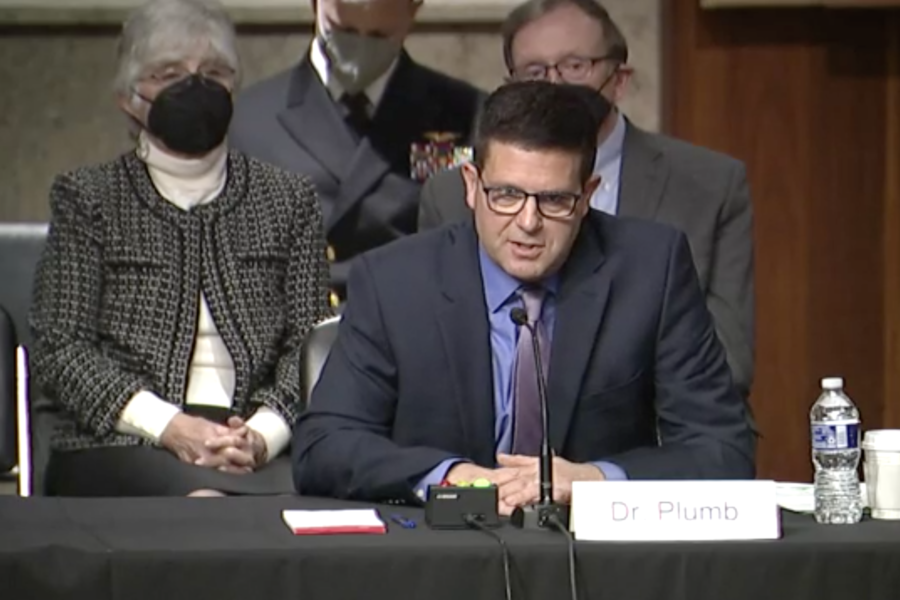The push to move responsibility for space traffic management from the Pentagon to a civil authority has stalled, frustrating members of Congress who want the Department of Commerce to take over the mission from the Space Force.
The first-ever nominee to be Assistant Secretary of Defense for Space Policy endorsed that effort during his confirmation hearing Jan. 13 and pledged to help Congress determine what is needed to make that happen.
John Plumb, testifying before the Senate Armed Services Committee, called space traffic management “absolutely essential” to the domain. And in response to questions from Sen. Jeanne Shaheen (D-N.H.), he promised to increase DOD transparency on the cost of that mission, an issue Shaheen said was preventing Senate appropriators from allocating the proper amount of funds to the Commerce Department.
“I do agree that it should be conducted by a civil agency, not the Department of Defense, and I will commit to you to work to help discover the right amount of resources and training and opportunities needed to make that shift,” Plumb said. “It is a difficult shift, but I think it’s needed.”
The question of space traffic management took on renewed importance after a Russian anti-satellite weapon test this past November created a massive debris field, forcing astronauts on the International Space Station to take shelter in return ships and threatening access to space for countries around the world.
That test—the latest conducted by the Russians and similar to a 2007 test by China—underscores the need for “norms and rules of behavior” in space, Plumb said, echoing a common refrain among Defense Department and Space Force officials over the past few months.
“I think one of the issues that makes space unique is that a destructive test like the Russians have recently conducted challenges access to all spacefaring nations, and we need to find ways to prevent that type of problem,” Plumb said.
The most direct way to do that would be an international treaty to ban kinetic anti-satellite tests, a measure Deputy Defense Secretary Kathleen H. Hicks endorsed at a recent meeting of the National Space Council and one Plumb also said he supports.
But while China and Russia have co-sponsored treaties submitted to the United Nations seemingly aimed at avoiding a space arms race and destructive tests, their actions in the domain have proved them to be “disingenuous,” Plumb wrote in advance policy questions submitted to SASC.
Those treaties, Plumb wrote, “do not provide pragmatic, equitable, or verifiable mechanisms that would enhance U.S. national security interests.”
Speaking at the confirmation hearing, though, Plumb stopped short of saying he thought the U.S. would never be able to find common ground on the issue with China and Russia.
“I do think there is a need for rules and for norms in space behavior. And I hold some deep kernel of hope that we could come to an agreement with Russia and China on that in some not-too-distant future,” Plumb said. “At the same time, nothing there would, in my mind, prevent us or preclude us from pursuing both offensive and defensive capabilities to ensure that we can defend our own assets and prevail in a conflict.”
One capability the U.S. can and should build to discourage destructive behavior, Plumb said, is resiliency in its satellite constellations so that DOD can “withstand a blow to one or several satellites.”
“I think being able to reconstitute quickly and having a resilient architecture makes the attractiveness of a target much less, and I think that’s a really important place,” Plumb said. “I don’t think we’re moving fast enough, and we need to get going.”
Resiliency in space architecture is a topic other Pentagon and Space Force officials also have stressed, as plans for a large constellation of low-Earth orbit satellites unfold. The hope is that by launching larger numbers of satellites, the destruction of some by an anti-satellite weapon wouldn’t cripple the Pentagon’s space capabilities.
“As soon as you start moving out of single-digit spacecraft, the ability to stitch them all together in a resilient communication mesh is going to be a critical enabler to overcome the threats and the challenges that we face and [to] build a much less brittle architecture,” Stephen Forbes, Blackjack program manager at DARPA, said at a recent Mitchell Institute for Aerospace Studies event.
Plumb aligned himself with previous comments from top DOD space officials on one other front during his confirmation hearing. When asked by Sen. Joe Manchin (D-W.V.) if he believed there should be a Space National Guard, Plumb said his personal belief was that “there is value in Guard and Reserve support for the Space Force.”
